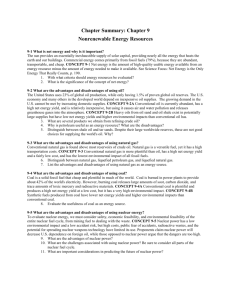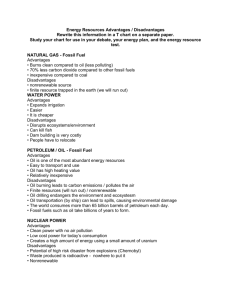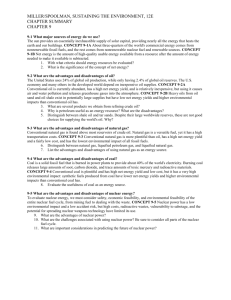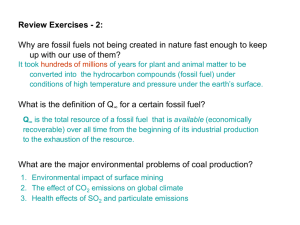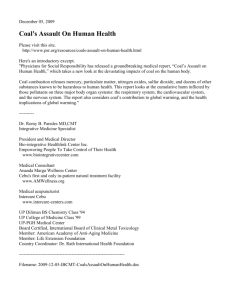chapter 15-3 to 15
advertisement
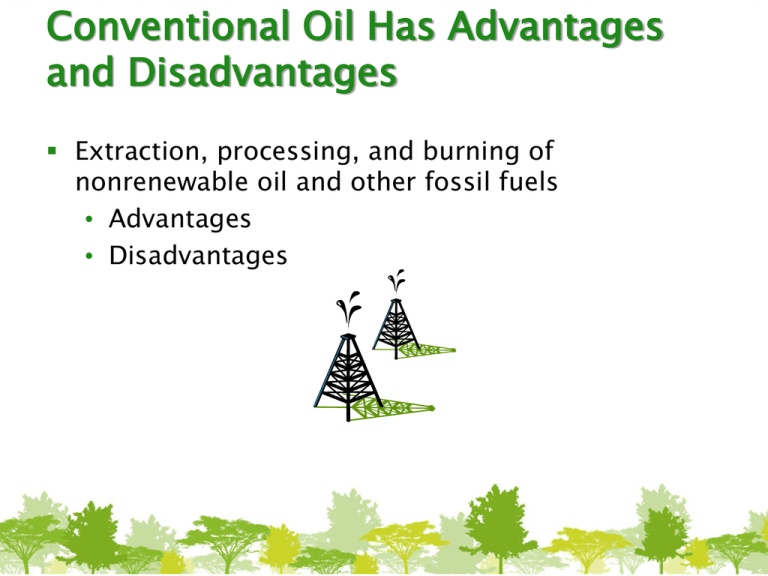
Conventional Oil Has Advantages and Disadvantages Extraction, processing, and burning of nonrenewable oil and other fossil fuels • Advantages • Disadvantages Trade-Offs: Conventional Oil, Advantages and Disadvantages 15-3 Will Heavy Oil Spills from Oil Sand Be a Viable Option? Oil sand, tar sand contains bitumen Canada and Venezuela: oil sand have more oil than in Saudi Arabia Extraction • Serious environmental impact before stripmining • Low net energy yield: Is it cost effective? Oil Sand Refinery Will Oil Shales Be a Useable Resource? Oil shales contain kerogen • After distillation: shale oil 72% of the world’s reserve is in arid areas of western United States; there is a catch! • Locked up in rock • Lack of water needed for extraction and processing • Low net energy yield Oil Shale Rock and the Shale Oil Extracted from It Trade-Offs: Heavy Oils from Oil Shale and Oil Sand 15-3 What Are the Advantages and Disadvantages of Natural Gas? Concept 15-3 Conventional natural gas is more plentiful than oil, has a high net energy yield and a fairly low cost, and has the lowest environmental impact of all fossil fuels. Natural Gas Is a Useful and CleanBurning Fossil Fuel (1) Natural gas: mixture of gases • More than half is CH4 (methane) Conventional natural gas • Pipelines • Liquefied petroleum gas (LPG) • Liquefied natural gas (LNG) – low net energy yield Unconventional natural gas • Coal bed methane gas • Methane hydrate Trade-Offs: Conventional Natural Gas 15-4 What Are the Advantages and Disadvantages of Coal? Concept 15-4A Conventional coal is very plentiful and has a high net energy yield and low cost, but it has a very high environmental impact. Coal Comes in Several Forms and Is Burned Mostly to Produce Electricity Coal: solid fossil fuel Burned in 2100 power plants, generates 40% of the world’s electricity • Inefficient Three largest coal-burning countries • China • United States • Canada Stages in Coal Formation over Millions of Years Science: Coal-Burning Power Plant Coal Is a Plentiful but Dirty Fuel (1) World’s most abundant fossil fuel • U.S. has 25% Environmental costs of burning coal • Severe air pollution • • • • Sulfur released as SO2 Large amount of soot CO2 Trace amounts of Hg and radioactive materials Environmentalists call for • Taxation on CO2 production by power plants • Cleaner coal-burning plants CO2 Emissions Per Unit of Electrical Energy Produced for Energy Sources Coal Has Advantages and Disadvantages Single biggest air polluter in coal-burning countries One-fourth of the annul CO2 emissions Many opposed to new coal-burning power plants Advantages Disadvantages Trade-Offs: Coal, Advantages and Disadvantages as an Energy Resource
